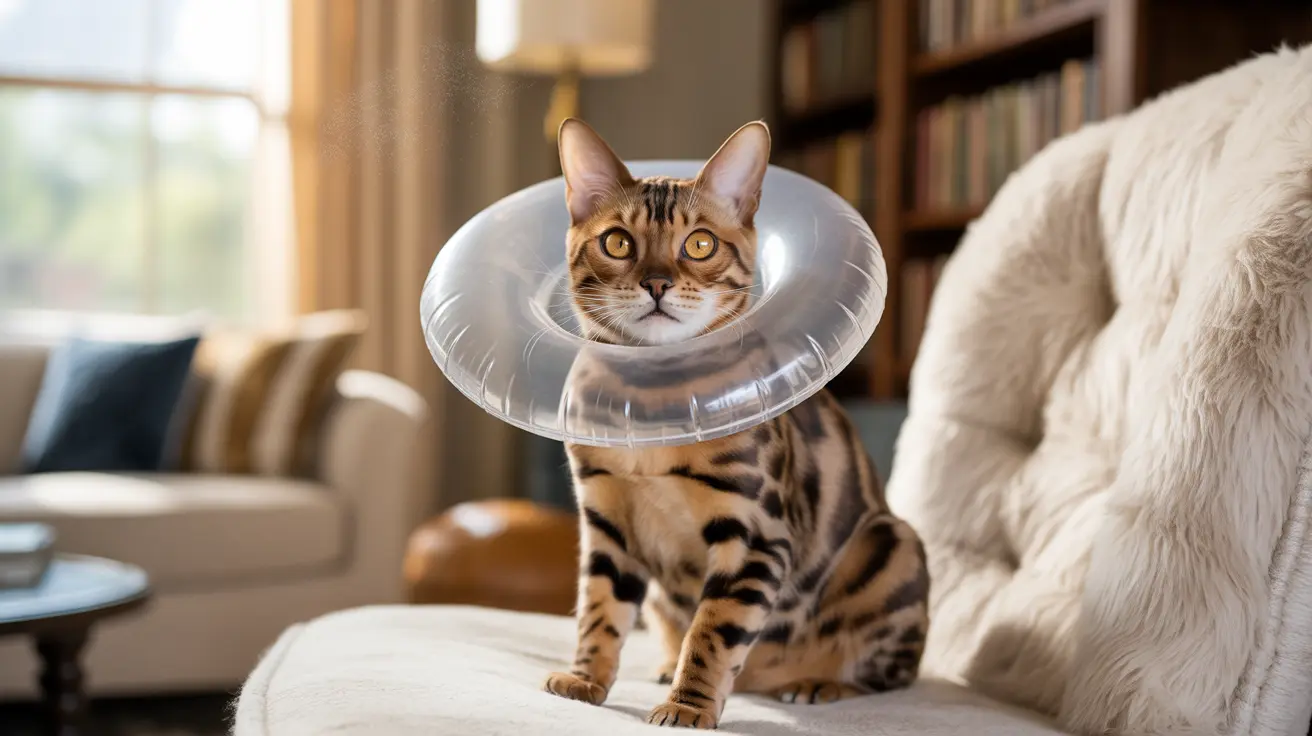Inflatable Collars: A Popular Comfort Solution
Inflatable collars have revolutionized post-surgical care for cats. These donut-shaped devices work like neck pillows, providing a soft but effective barrier that prevents cats from reaching wounds while maintaining their peripheral vision and mobility.
- Lightweight and comfortable design
- Better visibility compared to traditional cones
- Allows easier eating and drinking
- More natural sleep positions
- Less anxiety and stress for your cat
Soft E-Collars and Fabric Solutions
Soft e-collars represent a significant improvement over rigid plastic cones. Made from flexible, padded materials, these collars provide necessary protection while maximizing comfort.
- Machine washable fabric
- Reduced noise during movement
- More natural range of motion
- Various designs and styles available
- Better sleeping comfort
Recovery Suits: Full-Body Protection
Recovery suits offer an innovative approach to wound protection, especially for body and torso injuries. These protective garments cover specific areas while allowing normal movement and activities.
- Post-surgical recovery
- Preventing access to stitches
- Protecting wounds on the torso
- Reducing anxiety compared to collar options
- Maintaining normal behavior patterns
DIY Solutions and Alternative Options
For those seeking cost-effective solutions, several DIY alternatives can provide temporary protection. However, these should always be implemented with veterinary guidance and close supervision.
- Soft fabric collars made from towels
- Modified pool noodle collars
- Custom-fitted bandaging solutions
- Temporary protective wraps
Choosing the Right Alternative
Selecting the most appropriate cat cone alternative depends on several factors:
- Location of the wound or surgical site
- Your cat's temperament and flexibility
- Duration of required protection
- Your ability to monitor your pet
- The specific recommendation of your veterinarian
Frequently Asked Questions
What are the most comfortable alternatives to the traditional plastic cat cone for wound protection?
The most comfortable alternatives include inflatable collars, soft fabric e-collars, and recovery suits. Inflatable collars are particularly popular as they provide a good balance of protection and comfort while allowing better visibility and movement than traditional cones.
How effective are inflatable collars compared to traditional e-collars for preventing cats from licking or biting wounds?
Inflatable collars are generally as effective as traditional e-collars for most wound locations, except for face and paw injuries. They offer better comfort and visibility while maintaining protection, though some determined cats may still reach certain areas.
Can recovery suits fully replace cones for cats recovering from surgery, and what areas do they best protect?
Recovery suits can fully replace cones for wounds on the torso, abdomen, and back. However, they may not be suitable for protecting wounds on the face, legs, or tail. They're particularly effective for surgical sites on the main body.
Are DIY cat cone alternatives safe, and what materials can I use to make a soft collar at home?
DIY alternatives can be safe when properly constructed and monitored. Safe materials include soft towels, pool noodles, and medical wrap. However, always consult your veterinarian before using any DIY solution and ensure proper fit to prevent choking hazards.
How should I choose and fit a cat cone alternative to ensure it prevents my cat from reaching its wounds without causing distress?
Choose an alternative based on the wound location and your cat's flexibility. Ensure proper sizing by allowing two fingers' width between the device and neck. The device should extend just beyond the nose without restricting eating or drinking. Monitor your cat's comfort and ability to reach the wound during initial use.






